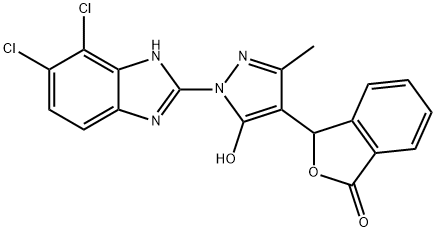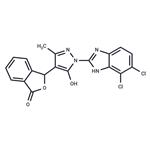Description
RU.521 (2262452-06-0) is an inhibitor of cyclic GMP-AMP synthase (cGAS), an important innate immune system sensor of foreign cytoplasmic double-stranded DNA.1,2 IC50 = 0.70 μM in dsDNA-stimulated RAW macrophages1 and ~0.80 μM in wild type human THP-1 cells2. It is selective for cGAS with no targeting of IFNB1 protein, interferon receptors, or downstream signaling components of the JAK/STAT pathway. RU.521 was able to significantly increase cardiac output in a mouse model of sepsis.3 Active in both mouse and human cell lines.
Uses
In sequence, RU.521 were diluted in the solution containing 10% DMSO, 40% PEG300, 5% Tween-80% and 45% saline. Then, the solution was sonicated until there was no obvious precipitation. The method of administration and the effectiveness of RU.521 was described in previous studies. In brief, mice were intraperitoneally injected with 100 μL solution with or without RU.521 at a 5 mg/kg dose for 3 consecutive days. The intraperitoneal injection was performed within 1 h after the initial intratracheal injection of ZnONPs.
Biological Activity
RU.521, a small molecule inhibitor of cGAS, has demonstrated activity and selectivity in cyclic GMP-AMP synthase-mediated signalling cellular assays. Furthermore, it has been shown to reduce the constitutive expression of interferon in macrophages from a mouse model of Aicardi-Goutieres syndrome. The use of RU.521 to inhibit the cGAS-STING signalling pathway has been found to effectively suppress microglial M1-polarization in the spinal cord, reducing neuropathic pain symptoms. The exact effect and mechanism of RU.521 in the pathological process that occurs after SAH has not yet been fully understood. Based on the evidence presented, the hypothesis was that the cGAS-STING pathway could contribute to microglial polarization and neuroinflammation after experimental subarachnoid hemorrhage. Pharmacological inhibition of the cGAS-STING signaling pathway with RU.521 could potentially mitigate subarachnoid hemorrhage-induced brain injury by regulating microglial polarization and neuroinflammation[3].
Biochem/physiol Actions
The potency and selectivity of a chemically improved inhibitor, RU.521, in cellular assays show that while it inhibits cGAS-mediated interferon upregulation, it has reduced to no effect on inflammatory pathways independent of cGAS. Furthermore, RU.521 suppresses the chronically elevated levels of type I interferon observed in primary macrophages from Trex1 null mice, a model of AGS. Crystal structures show that RU.521 occupies the catalytic pocket of murine cGAS, thus interfering with the entry of its ATP and GTP substrates. RU.521 inhibits cytoplasmic DNA-dependent upregulation of IRF3-dependent transcriptional targets only in the presence of an intact cGAS-STING pathway[1-2].
References
Vincent et al. (2017), Small molecule inhibition of cGAS reduces interferon expression in primary macrophages from autoimmune mice; Nat. Commun. 8 750
Wiser et al. (2020), Small molecule inhibition of human cGAS reduces total cGAMP output and cytokine expression in cells; Sci. Rep. 10 7604
Xu et al. (2020), Small molecule inhibition of cyclic GMP-AMP synthase ameliorates sepsis-induced cardiac dysfunction in mice; Life Sci. 260 118315
[1] Jessica Vincent. “Small molecule inhibition of cGAS reduces interferon expression in primary macrophages from autoimmune mice.” Nature Communicatio
ns (2017): 750.
[2] Caroline Wiser. “Small molecule inhibition of human cGAS reduces total cGAMP output and cytokine expression in cells.” Scientific Reports (2020): 7604.
[3] Shao, Jiang et al. “RU.521 mitigates subarachnoid hemorrhage-induced brain injury via regulating microglial polarization and neuroinflammation mediated by the cGAS/STING/NF-κB pathway.” Cell communication and signaling : CCS vol. 21,1 264. 28 Sep. 2023, doi:10.1186/s12964-023-01274-2

